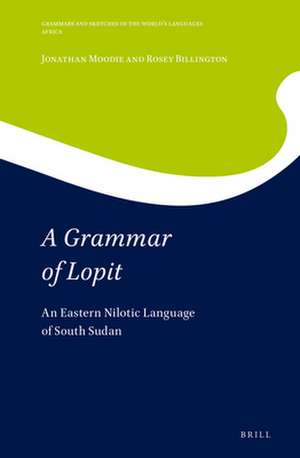A Grammar of Lopit: An Eastern Nilotic Language of South Sudan: Grammars and Sketches of the World's Languages / Africa, cartea 11
Autor Jonathan Moodie, Rosey Billingtonen Limba Engleză Hardback – 16 sep 2020
Preț: 907.05 lei
Preț vechi: 1106.16 lei
-18% Nou
Puncte Express: 1361
Preț estimativ în valută:
173.59€ • 180.56$ • 143.31£
173.59€ • 180.56$ • 143.31£
Carte indisponibilă temporar
Doresc să fiu notificat când acest titlu va fi disponibil:
Se trimite...
Preluare comenzi: 021 569.72.76
Specificații
ISBN-13: 9789004430662
ISBN-10: 9004430660
Dimensiuni: 155 x 235 mm
Greutate: 0 kg
Editura: Brill
Colecția Brill
Seria Grammars and Sketches of the World's Languages / Africa
ISBN-10: 9004430660
Dimensiuni: 155 x 235 mm
Greutate: 0 kg
Editura: Brill
Colecția Brill
Seria Grammars and Sketches of the World's Languages / Africa
Cuprins
Acknowledgements
List of Figures and Tables
1 Introduction
1 Historical Involvement of Women in Crime in Early Modern Europe
2 Crime and Gender in an Early Modern Italian City
3 Criminal Court Records as Sources for Social History
4 Composition of This Book
2 Women’s Roles, Institutions, and Social Control
1 Political and Demographic Developments
2 Household Structures, Property Rights and Legal Capacity
3 Women within the Urban Economy
4 Interlocking Systems of Assistance and Control
5 Conclusion: Agency within a Culture of Constraint
3 The Torroneand the Prosecution of Crimes
1 The Tribunale del Torrone within Bologna’s Legal Landscape
2 The Administration of Criminal Justice
3 Criminal Procedures
4 Italian Women’s Involvement in Recorded Crime
5 The Character of Indicted Crime in Bologna
6 Gender Dynamics in the Sentencing of Crimes
7 Conclusion: Distinguishing Features of Women’s Prosecution
4 Denunciations and the Uses of Justice
1 Women and the Uses of Justice
2 Denunciations before the Torrone
3 The Torrone as a Forum for Conflict Resolution
4 The Urban Context of Women’s Litigation
5 The Users of Justice
6 Objectives of Litigation
7 Conclusion: Criminal Litigation, Gender and Agency
5 Violence and the Politics of Everyday Life
1 The Culture of Violence between Prosecution and Reconciliation
2 Lethal Violence in the Seventeenth and Eighteenth Centuries
3 Insults and the Politics of Daily Life
4 The Importance of Petty Physical Violence
5 Severity and Weapons
6 Violence and Social Relations
7 The Gendered Geography of Violence
8 Framing Men’s and Women’s Violence
9 Conclusion: Everyday Violence and the Uses of Justice
6 Theft and Its Prosecution
1 Legal Attitudes towards Theft
2 Prosecution and Sentencing
3 The Social Profile of Thieves and Economies of Makeshift
4 Stolen Goods
5 The Geographies of Theft
6 The Distribution of Stolen Goods
7 Conclusion: Judicial Paternalism and Women’s Roles in Thieving
7 Conclusion
1 The Case of Bologna and Patterns of Female Crime
2 The Impact of Institutionalisation, Judicial Paternalism and Peacemaking Practices
3 Crime and Italian Women’s Agency
4 Avenues for Future Research
Appendix: Information on Samples
Bibliography
Index
List of Figures and Tables
1 Introduction
1 Historical Involvement of Women in Crime in Early Modern Europe
2 Crime and Gender in an Early Modern Italian City
3 Criminal Court Records as Sources for Social History
4 Composition of This Book
2 Women’s Roles, Institutions, and Social Control
1 Political and Demographic Developments
2 Household Structures, Property Rights and Legal Capacity
3 Women within the Urban Economy
4 Interlocking Systems of Assistance and Control
5 Conclusion: Agency within a Culture of Constraint
3 The Torroneand the Prosecution of Crimes
1 The Tribunale del Torrone within Bologna’s Legal Landscape
2 The Administration of Criminal Justice
3 Criminal Procedures
4 Italian Women’s Involvement in Recorded Crime
5 The Character of Indicted Crime in Bologna
6 Gender Dynamics in the Sentencing of Crimes
7 Conclusion: Distinguishing Features of Women’s Prosecution
4 Denunciations and the Uses of Justice
1 Women and the Uses of Justice
2 Denunciations before the Torrone
3 The Torrone as a Forum for Conflict Resolution
4 The Urban Context of Women’s Litigation
5 The Users of Justice
6 Objectives of Litigation
7 Conclusion: Criminal Litigation, Gender and Agency
5 Violence and the Politics of Everyday Life
1 The Culture of Violence between Prosecution and Reconciliation
2 Lethal Violence in the Seventeenth and Eighteenth Centuries
3 Insults and the Politics of Daily Life
4 The Importance of Petty Physical Violence
5 Severity and Weapons
6 Violence and Social Relations
7 The Gendered Geography of Violence
8 Framing Men’s and Women’s Violence
9 Conclusion: Everyday Violence and the Uses of Justice
6 Theft and Its Prosecution
1 Legal Attitudes towards Theft
2 Prosecution and Sentencing
3 The Social Profile of Thieves and Economies of Makeshift
4 Stolen Goods
5 The Geographies of Theft
6 The Distribution of Stolen Goods
7 Conclusion: Judicial Paternalism and Women’s Roles in Thieving
7 Conclusion
1 The Case of Bologna and Patterns of Female Crime
2 The Impact of Institutionalisation, Judicial Paternalism and Peacemaking Practices
3 Crime and Italian Women’s Agency
4 Avenues for Future Research
Appendix: Information on Samples
Bibliography
Index
Notă biografică
Jonathan Moodie is a research associate at The University of Melbourne (Ph.D., 2019). His primary research interest is the documentation and description of Eastern Nilotic languages, focusing on the Lopit and Lokoya languages of South Sudan.
Rosey Billington is a postdoctoral fellow at The University of Melbourne (Ph.D., 2017). Her primary research interest is the intersection of experimental phonetics and language documentation, with a focus on phonetic and phonological analyses of Nilotic and Oceanic languages.
Rosey Billington is a postdoctoral fellow at The University of Melbourne (Ph.D., 2017). Her primary research interest is the intersection of experimental phonetics and language documentation, with a focus on phonetic and phonological analyses of Nilotic and Oceanic languages.






